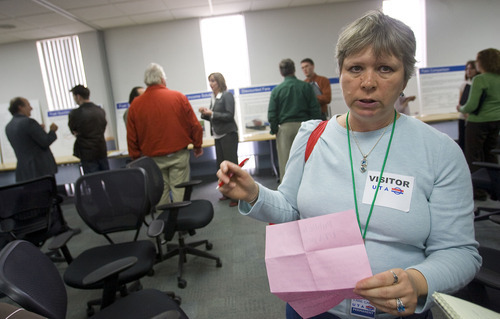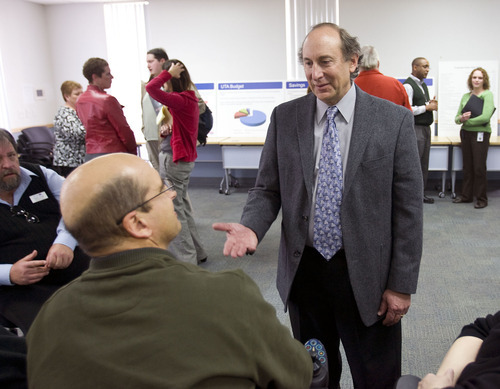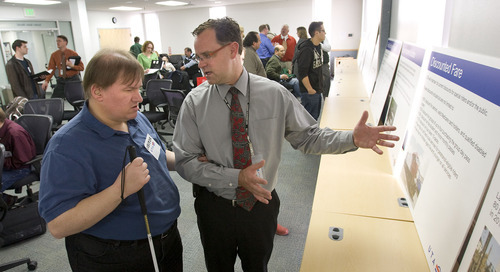This is an archived article that was published on sltrib.com in 2011, and information in the article may be outdated. It is provided only for personal research purposes and may not be reprinted.
Painful reality or unnecessary pinch?
Those rival sentiments split a Utah Transit Authority hearing Thursday as the transit agency rolled out plans to raise most bus and rail fares — already among the highest in the nation — 25 percent over the next two years.
An International Rescue Committee worker worries higher fees will hurt Utah's refugees, already surviving on pennies. If they cannot afford transportation, she warns, they probably cannot get to work.
A blind man who relies on UTA to commute from his Bountiful home to his West Valley City workplace supports the increase, "because I don't want to see service go down."
An Off Broadway Theatre volunteer wonders whether the agency is turning to higher fares too quickly. Improve services, the Draper man advises, and ridership will fix some of the financial problems.
After two public hearings in Utah and Davis counties that produced almost no public comment — only one spectator attended each — UTA presented its plan Thursday before a crowd of nearly two dozen people at agency offices in Salt Lake City.
With operating costs rising and sales tax revenues falling by tens of millions of dollars, UTA spokesman Gerry Carpenter said, a fare hike is needed. The previous rate increase — not counting a 25-cent surcharge to cover the costs of high-priced fuel — came in April 2009.
The current bus or TRAX fare costs $2.25 (including the 25 cents for fuel). UTA wants to charge a base fare of $2.50 by April 2013.
"It is unfortunate, but understandable," says Jackie Morehead, a Salt Lake City resident who relies entirely on UTA to get around. "It seems the realities of fuel costs, ridership and a big span of territory to cover have all kicked in to give us a big old rate hike. It is disappointing."
And yet, UTA's fares already rank among the nation's highest. They are tied for fifth among 193 transit systems nationally that responded to an American Public Transportation Association survey completed in August. While UTA conceded Thursday that it charges more than other systems, officials said it has much to do with light rail, which not all agencies provide.
In the coming months and years, UTA will add four TRAX lines in the Salt Lake Valley and a FrontRunner extension from Salt Lake City to Provo.
John Lopez travels daily from his Draper home to Salt Lake City to volunteer at Off Broadway Theatre. Trouble is, he has to walk almost a mile to get to the bus stop on 12300 South. He wonders if UTA is taking the same approach his granddaughter did in trying to raise $5 with a lemonade stand. She tried to sell her first glass for $6.
"I get the impression that is what is happening here," he says. "If you improve the service and increase ridership, you wouldn't have to raise rates that high."
Sometimes the reasons passengers oppose the steeper fares are personal:
"Some of us disabled people can't work," says Midvale resident Amy Larrabee, "and can't afford the fare."
Other times, the reasons are professional:
"There is literally no extra room for an increase," says Melissa Aldape, who works with the International Rescue Committee to help refugees transition into the community.
She fears that a bump of even a couple of dollars for a monthly pass could prevent her clients from working. "I can't imagine them making it without a bus pass."
UTA officials say they are reaching out to low-income riders. About 20,000 passengers now receive UTA's discounted fare. The agency is working with the state to make those discounts more widely available, perhaps to as many as 100,000 riders.
"If people really can't afford to pay full price," Carpenter said, "they shouldn't have to."
Not everyone opposes UTA's plan. Bountiful resident Trent Florence sat in the front row during Thursday's hearing with his walking stick. Florence is blind. He depends on public transit to reach Discover Financial Services, where he works. He's willing to pay more.
"I get tired," he says, "of seeing service cut all the time."
More UTA hearings
Tooele County • 5:30 to 7 p.m., Feb. 22, Tooele County Courthouse, Auditorium, 47 S. Main, Tooele
Salt Lake County • 5:30 to 7 p.m., Feb. 23, UTA offices, 669 W. 200 South, Salt Lake City
Box Elder County • 5:30 to 7 p.m., Feb. 24, Brigham City Hall, Council Chambers, 20 N. Main, Brigham City







